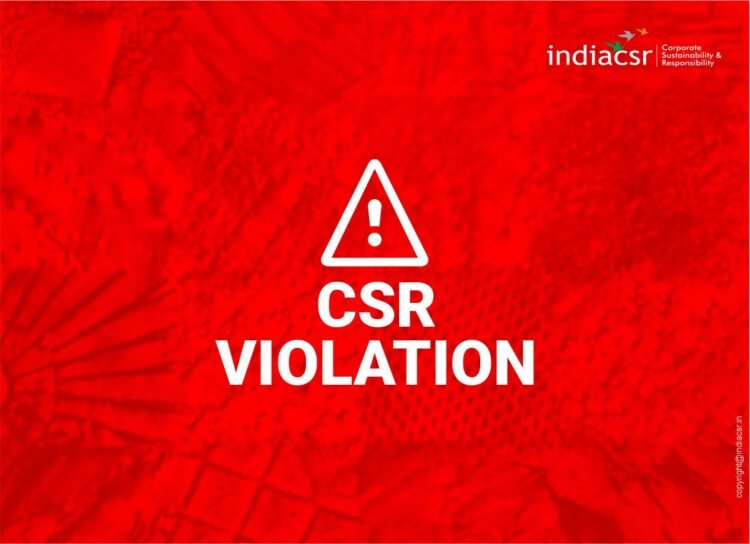Saankhya Labs Private Limited’s case emphasizes the necessity of meeting CSR spending requirements set by the Companies Act, 2013. Non-adherence can result in penalties, showcasing the government’s dedication to corporate social responsibility enforcement.
BENGALURU (India CSR): In a noteworthy development, the Registrar of Companies in Karnataka has taken a decisive step by imposing a substantial penalty of Rs. 66,16,156 (66.16 Lakhs) on Saankhya Labs Private Limited for their non-compliance with Corporate Social Responsibility (CSR) provisions as per Section 135(6) of the Companies Act, 2013.
This significant adjudication has broader implications for the corporate world, emphasizing the importance of adhering to CSR regulations and fostering corporate governance.
The Companies Act, 2013, has laid down stringent provisions regarding Corporate Social Responsibility (CSR) spending obligations for companies operating in India. Section 135 of the Act outlines these obligations, emphasizing the need for companies to allocate a specific percentage of their profits to CSR activities.

Appointment of Adjudicating Officer
The Ministry of Corporate Affairs, in alignment with Section 454 of the Companies Act, 2013, appointed an Adjudicating Officer to preside over this case. This decision underscores the government’s commitment to enforcing corporate accountability and ensuring that companies fulfill their CSR obligations.
Saankhya Labs Private Limited: A Brief Overview
Saankhya Labs Private Limited, established in 2006, is a company operating under the jurisdiction of the Registrar of Companies, Karnataka. Their recent penalty serves as a stark reminder that irrespective of a company’s history or size, adherence to CSR regulations is non-negotiable.

CSR Committee and its Mandate
One of the fundamental requirements outlined in Section 135(1) of the Companies Act, 2013 is for companies that meet specific financial criteria to establish a Corporate Social Responsibility Committee. This committee is pivotal to ensuring responsible business practices and comprises a minimum of three directors, with at least one of them being an independent director.
***
Implications for Corporate Governance
The penalty levied on Saankhya Labs Private Limited serves as a strong precedent for enforcing corporate governance principles. It emphasizes the government’s commitment to maintaining transparency and accountability within the corporate sector, as adherence to CSR regulations is essential not only for societal welfare but also for maintaining the integrity of businesses.
Also Read I Download Presentation On India CSR Law – India CSR

***
CSR Spending Obligations
Section 135(5) of the Companies Act, 2013, establishes a clear mandate for companies. They are required to allocate at least two percent of the average net profits made during the three immediately preceding financial years towards CSR activities, in accordance with their Corporate Social Responsibility Policy.
***
Unspent CSR Amount and Transfers
Section 135(6) of the Act further stipulates that any unspent CSR amount from ongoing projects must be transferred to a special account known as the Unspent Corporate Social Responsibility Account within 30 days from the end of the financial year. Subsequently, this unspent amount should be expended within three financial years, or it must be transferred to a Fund specified in Schedule VII.
***
Penalty Provisions
Section 135(7) introduces the concept of penalties for non-compliance with CSR spending obligations. In case of default, a company can be held liable for a penalty, and the officers of the company may also face penalties for their involvement or negligence.
Also Read: Test Your Knowledge On CSR Law In India – India CSR
***
CSR Accountability and Beyond
This significant penalty case highlights the need for companies to take their CSR obligations seriously. Beyond the financial penalty itself, it underscores the reputational risks and potential legal consequences that companies face when they fail to meet their CSR obligations. It is a clarion call for corporate entities to reevaluate their commitment to social responsibility and integrate it seamlessly into their business strategies.
***
Penalty Breakdown
For the financial misconduct spanning two different fiscal years, penalties have been levied on both the company and the respective defaulting officers. Here’s the breakdown:
Financial Year 2020-21
- Company: Rs. 31,26,064
- Parag Naik Balwant: Rs. 1,56,304
Financial Year 2021-22
- Company: Rs. 31,21,624
- Parag Naik Balwant: Rs. 1,56,082
- Anusha: Rs. 1,56,082
Payment Instructions & Appeals
The company, along with its directors and key managerial staff, are directed to settle the penalty sums within a period of 90 days from the order’s receipt date and ensure all requisite forms are submitted. Should there be any objections, an appeal may be lodged with the Regional Director within a 60-day timeframe.
(India CSR)






















